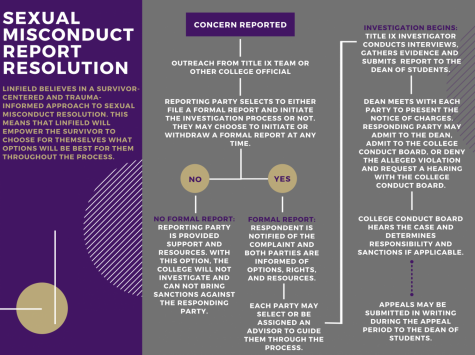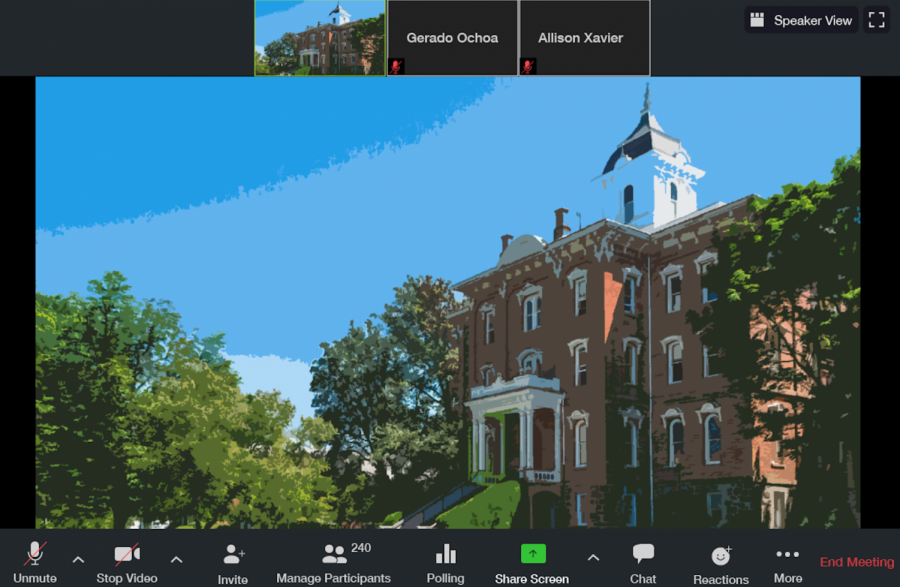President Davis addresses Linfield community regarding recent Title IX complaints
President Miles K. Davis delivers his address about Linfield’s sexual misconduct reporting and investigation processes.
May 27, 2020
President Miles K. Davis addressed students, faculty, staff and Board of Trustees members about the recent allegations of sexual assault circling the Linfield community on Tuesday.
Davis’ speech ran about 10 minutes over Zoom, addressing around 243 participants. Although there was no question-and-answer segment and the chat function was disabled, the registration message from the office of the president provided an email address where participants could send their questions.
Davis later said his office didn’t receive any questions, and that the address was never meant to be a public forum.
“We’re hearing in the Linfield Review and elsewhere that some students feel their reports of sexual abuse haven’t been taken seriously in recent years,” Davis said. He wanted to reiterate the college’s stance on sexual misconduct: that it will not be tolerated.
“It is especially hard to hear after we just did a comprehensive policy review with faculty, staff and students,” Davis said of the reports of sexual misconduct. He and Title IX coordinators established a task force to investigate Linfield’s sexual assault policies and reports, which is made up of five staff, two faculty and one student. The force concluded that Linfield is in compliance with all federal and state laws.
The report from the task force also said that the conduct process works when it is used by the students, but like many colleges and universities the weakness is when alleged survivors are reluctant to come forward in the midst of their state of stress and crisis.
Additionally, Secretary of Education Betsy DeVos has created new rules about university Title IX and sexual assault reporting, which will come into effect in August. Davis said the task force will adapt to the new federal provisions by continuing to grant all parties the right to due process.
“Please know this is not lip service, this is personal for many of us,” Davis said. He continued to say that he himself had been sexually abused at a young age.
“The college cannot investigate what it does not know about,” Davis said, encouraging people to come forward to student affairs and title IX coordinators. He reminded attendees that it is nearly impossible for the college to investigate third-party reports, rumors, and anonymous reports.
Davis also spoke about the new federal policies regarding Title IX, which he said mandate a request to investigate.
Title IX coordinator Susan Hopp said in an interview she has already put together a working group to adopt these new federal requirements. Colleges and universities must have these regulations in place by August 14. One impending change is that cross examination of the reporting party will be allowed at conduct hearings.
Hopp said she thinks Linfield was ahead of some of these changes particularly with providing support for respondents – the college has always provided advisors for both parties.
“We best serve our students by having clear policies and guidelines and following the letter and intent of the law,” Davis said in his address. “However, it does not help if people do not understand those policies and guidelines nor what the law is.”
“I found it to be very informing,” Audrey Collen, a senior said about the address. “[Davis] did a great job recognizing the student concerns about the sexual assault reporting at Linfield, while also providing a much needed perspective.”
“I think this address was absolutely necessary for students to understand the sexual assault reporting system at Linfield,” Collen said, who is also the founder of the Bystander Education Training Program at Linfield. “It was important that Davis encouraged those who felt a lack of justice from the system to talk to the Title IX coordinator.”
“It has to do with processes— processes that can be cumbersome,” Davis said about reporting and investigation policies.
In a later interview, Davis said his address was about his personal and professional approach to Title IX. In his position, he said, he is not directly involved in cases of alleged sexual misconduct.

“I’m not here to defend anyone, to rebut any arguments,” Davis said. He again encouraged anyone dissatisfied with the reporting process to contact Hopp.
“Trials by news outlets, social media, innuendos, or anything other than processes that protect both the accuser and the accused, harken back to dark times in our history,” he said in the address.
In an interview Hopp addressed concerns regarding no contact orders (NCOs), saying each one is individualized.
She underlined that an NCO is not a restraining order, and that Linfield’’s faculty and staff always work to prevent people involved in NCOs from seeing each other, but that it’s hard on such a small campus.
“I feel badly when those don’t work the way they’re supposed to,” Hopp said. She also said she would welcome any input on improving the NCO’s functionality.
In his address on Tuesday Davis emphasized four major points of communication on behalf of the administration:
-
Davis and his colleagues encourage students and faculty to report misconduct. He stressed that the college cannot investigate what it does not know.
-
All reports alleging sexual misconduct are investigated.
-
The reporting process is accuser-centered. This means those who come forward are always given the option of reporting through law enforcement or internally with the college.
-
When someone is found guilty of sexual abuse, there are consequences, but FERPA and Linfield’s own policies prohibit the college from publicizing them.
“Colleges and universities are not courtrooms,” Davis said in his address.
After an investigation begins, the materials and involved persons present to the college conduct board— an assembly of their peers.
Senior Grace Thompson-Johnston said she would have liked to hear a clear plan for sexual misconduct investigation reform. “It just felt like they did this to show that Linfield cares and hears our concerns but they didn’t visibly outline a plan of action for change,” she said.
In response to complaints that survivors have had to pay for recommended counseling services at the Linfield Student Health and Wellness center, Hopp said that “any time a student makes a request for an exemption, they should be able to receive counseling.” She said that the student can ask the director of the health wellness and counseling center to waive the fee, regardless of financial burden, if they are a survivor.
Davis advised the Linfield community to “commit to treat each other as fellow human beings, not objects to be mocked or treated as less than human.”
“Do I believe that every student is coming and reporting? No.” Hopp said, reiterating that people must report in order to elicit an investigation.
“Faculty care no more for students than staff, and staff care no more for students than administrators,” Davis said in his address. “Linfield does not exist to serve faculty or staff. I have asked the vice presidents to consider a new institutional goal for the 2020-21 academic year that involves introducing and improving measures of student wellbeing.”
As for addressing the potential of continued online classes due to COVID-19, Hopp said that there are already processes in place for online sexual harassment. Since classes have moved online she said she has spoken with two faculty members this semester who had students reveal harassment in online classes the faculty felt needed to be reported.
Hopp said that it is important to remember that this is a national issue, and that we know from national research that one in four students experience some sort of sexual misconduct. “That’s horrifying,” she said.
In his conclusion, Davis said he hopes the Linfield community can be one that empowers people to use their voices, and that no one reporting sexual abuse will be treated unfairly.
“This is how we change the culture,” he said. “We must become the change that we want to see.”
***
Editor-In-Chief Alex Jensen was a reporting contributor for this story.

